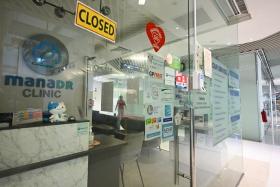Important that caregivers are educated on fall prevention, study shows
It highlights need to inform caregivers to shift from disease awareness to more action-orientated efforts
There is a greater need to educate caregivers here on fall prevention.
That is what a new study by the Lee Kuan Yew School of Public Policy and Amgen Biotechnology Singapore is calling for.
Through a survey of 858 respondents aged 45 and above, the study found that even though 61 per cent of respondents aged 60 and above are aware of fall prevention activities, only one in 10 have attended such programmes.
In light of the country's rapidly ageing population and that more Singaporeans are expected to be informal caregivers to their loved ones, the study highlights the need to inform caregivers of older adults to shift from disease awareness to more action-orientated efforts.
At a media session last week, Dr Reuben Ng, assistant professor at the Lee Kuan Yew School of Public Policy and the principal investigator of the study, urged for better education and support for younger caregivers, whose profiles range from foreign domestic workers to grandchildren, suggesting a "differentiated language and approach".
He said: "Younger people tend to use TikTok now, so maybe a falls prevention TikTok video can target the grandchildren."
He suggested that the information should be available in different languages to better reach foreign domestic workers, as well as in dialects like Hokkien to appeal more to older adults.
With the help of artificial intelligence (AI), Dr Ng analysed media coverage on the topic of bone health in Singapore, and pointed out that the narratives are "highly medicalised", which has resulted in negative sentiments that often hinder preventative actions.
CONDITION
He said: "When it's really medicalised, some people resist to think that they have a condition. (In the Singapore healthcare ecosystem), we have a lot of people going for screenings, but after they find out they have a condition, they don't do anything about it. So this is poor patient activation."
Sometimes, over-medicalised messages can also cause caregivers to overreact.
Research shows that 25 per cent of caregivers would restrict activities of older people to prevent falls, which could actually worsen the senior's muscle strength and social connection.
Dr Ng said caregivers should instead encourage older people to walk around with company.
Dr Chionh Siok Bee, president of the Osteoporosis Society Singapore and senior consultant at the National University Hospital's division of endocrinology, said that contrary to the popular belief that osteoporosis is inevitable with ageing, bone disease can be delayed or prevented if people maintain a "bone-healthy lifestyle" from a younger age.
She said: "(Before the pandemic), I was talking to the Health Promotion Board about starting sessions in schools. If people adopt a bone-healthy lifestyle from young and build up a good bone and muscle mass, they won't fracture so easily later on."
Get The New Paper on your phone with the free TNP app. Download from the Apple App Store or Google Play Store now


